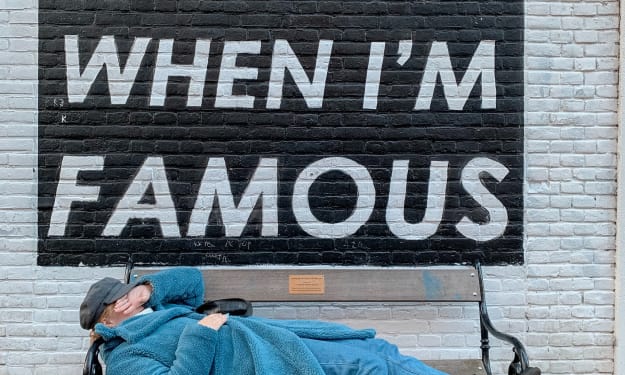Do Your Own Research
*searches* 'cake recipe easy'

Hello my lovelies, I hope you are well and enjoying the first signs of summer. This week I will be discussing a topic that I'm sure we are all too familiar with or have encountered at least once in our time on the internet and that is... having debacles with random strangers which inevitably ends with them barking the phrase: "Do your own research!"
This phrase has become an automatic fail-safe for anyone who (or at least in my experience) shares the opposite opinion to you, someone who likes to think of themselves 'outside of the matrix', and often refers to the general public as the 'masses' or 'sheeple.' Consider when the COVID-19 vaccines were first made available, for instance, everyone was in essence, doing their own research.
But what does this actually mean? What constitutes as credible, valid and reliable research? And how can research be credible when misinformation is in every space on the internet? Not only this but who has the authority to verify our research? Is it the sources we use and the data we present as evidence? Is it decided by the origin of the information whether primary or secondary research (educational institution, media, etc.) or ultimately do we just decide what is viable research based on our own agenda of what we perceive to be the facts or our truths?
Everything you search on the internet is dependent on how you phrase your research. Let's say I type in 'cake recipe easy' this shows up:

Then I type in 'cake recipes without eggs,' and these are the results:

Now I know that is a very simple analogy, but you get my jist, right? The topic of research is in this instance, cakes, yet if I add any specifics, (additional words) the results will obviously differ ever so slightly. So let us take this analogy as we quickly reflect back to Spring 2021 when the main topic of research at the time was COVID-19 vaccinations. Oh yes, I'm sure you remember the nightmare it was, stuck in the firing line between 'you need the vaccine to protect yourself and others,' and 'I've done my research and I'm not having it. I don't know what's in it.'
It was kinda an information shit show to be completely honest, it was so confusing (for me anyway) because I didn't know what was the truth and what was just hysteria. That's the problem when you fall down an internet rabbit hole, some are filled with facts, figures, statistics, and a pie chart if you're lucky. While other rabbit holes are filled with conspiracy theories or theories with multiple flaws like I don't know... flat earth theory? These are typically theories where the evidence presented has been somewhat twisted or bent towards a certain line of argument/agenda, conveying what appears to be fact or truth or at least their truth.
With all of this to consider, I will return back to my original questions, firstly let's start with simply what does doing your own research mean? When we do our own research (typically on the internet), we are researching for information, facts, data, and truths, this is often secondary, as it has been provided to you by the internet, which is made up of what? Other researchers.
Researchers who conduct their own interviews or experiments to test a hypothesis let's say, are finding primary research, as they are discovering the research first-hand. In other words, the research you find is either primary or secondary, and because most of us do our research online, it is mostly secondary. Also, did you know 69% of the entire global population is active on the internet? Madness, anyway as usual I digress...
Annoyingly, this invites another question to explore, which is, how can we trust this research when we are thinking about the viability of the research? Okay, so if we have the Daily Mail and the NHS website (National Healthcare Service) advising the general public on COVID-19 symptoms, what channel of information are you more likely to trust? The NHS, because it's a trusted healthcare service, compared to a tabloid newspaper that has historically preyed on the public fears.
When we are doing our own research are we more likely to trust a long-standing institution or the word of mouth from our friends, family, and the communities we live in? The problem with the truth or facts, is that if it is repeated enough, and spread through by multiple people from different backgrounds, how can you not trust it? Everyone is saying it.
So what do you do?
It's a lot I know, but we will get there I promise, you're doing well. Have a moment here to make yourself a cuppa and take a breath...

Back to business, now as researching data and information, you have two modes of information or data collecting either qualitative or quantitive research or both. These are just fancy words that are defined as -
Qualitative research:
"is the process of collecting, analyzing, and interpreting non-numerical data, such as language. Defined as non-numerical data, such as text, video, photographs, or audio recordings. This type of data can be collected using diary accounts or in-depth interviews and analyzed using grounded theory or thematic analysis."
Quantitative research:
"involves the process of objectively collecting and analyzing numerical data to describe, predict, or control variables of interest. The goals of quantitative research are to test causal relationships between variables, make predictions, and generalize results to wider populations. Research is used to test a theory and ultimately support or reject it."
This table explains the types research and the methodology perfectly:

Now interpret your findings. How? What's your line of argument? Why did you do the research in the first place? Was it to one up on someone? Researching is not about victory, it is about progress and discovery never forget this.
So how can we navigate in a world that is contaminated with misinformation, deep fakes and phenomenal AI toolkits? Can you trust your eyes any more than you trust the origins of your sources?
I mean...

Okay, we have our topic of research, and we've found some results, now to verify our findings, we hunt for a direct counter-argument. This is the quickest way to find out if it's just hearsay, fake news, or simply a joke that didn't land the way it was meant to. This then becomes a part of your research as a whole, because you have more evidence to suggest that you have viable research as opposed to someone who read one article on the topic in a pub somewhere.
What I'm getting at is, anyone, and I mean anyone, can make sources look credible, or appear to be. This is why when researching it is vital to consider all available avenues of information, data and sources, whether you agree with it or not.
Then here comes the hardest bit, critical thinking. Interpret all your findings, analyse and criticise what you have found while considering what you are trying to argue/persuade. Critical thinking allows you to digest your research, and present your evidence in a clear and concise form. Taking your time to understand what you have discovered will enable you to verify your research and validate its credibility.
Be wary that not all research can be easily solved, and may require more research (research puzzles). Proper in-depth research should be time-consuming, be patient with it, not everything needs to be instantaneous.
I am not claiming to be the ultimate expert in research, I am just asking my readers and any other weirdos out there to consider this when you happen to be researching a certain topic.
Bloody hell, I'm going to get some cake.

References:
Qualitative Vs Quantitative Research: Methods & Data Analysis by Saul Mcleod, PhD: https://www.simplypsychology.org/qualitative-quantitative.html
_______________________________________________
Don't forget to leave some love and subscribe! And as always -
Stay safe, stay hopeful and stay blessed! :)
About the Creator
Rosie J. Sargent
Hello, my lovelies! Welcome, I write everything from the very strange to the wonderful; daring and most certainly different. I am an avid coffee drinker and truth advocate.
Follow me on Twitter/X @rosiejsargent97






Comments (2)
Awesome article! Great points and some really amazing reminders here.
You make a lot of solid points and speak on a lot of main questions concerning doing your own reserch. I had a traumatic flashback (of research for my dissertation that never came to be) midway through your article when you start breaking down qualitative vs. quantitative.